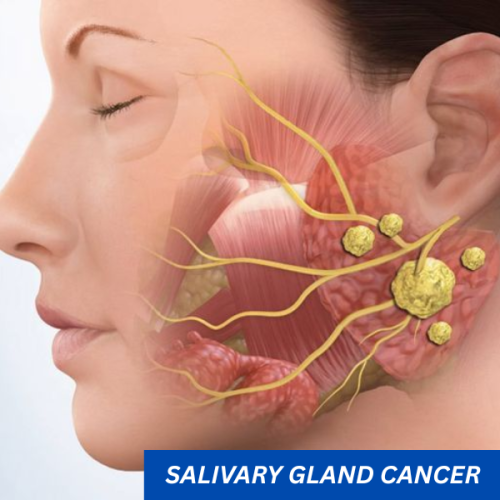
Best Salivary Gland Cancer Treatment in Hyderabad
Salivary gland cancer is a rare type of head and neck cancer that begins in the salivary glands, which produce saliva to help with chewing, swallowing, and digestion. These glands are located near the jaw, under the tongue, and inside the cheeks. While some tumors are harmless, cancerous growths can spread quickly if not treated on time.
In Hyderabad, Dr. Kranthi Kumar Gangiti, an experienced head and neck cancer specialist, provides accurate diagnosis and personalized treatment plans for salivary gland cancer, using advanced techniques to improve recovery and preserve vital functions like speech and facial movement.
What is Salivary Gland Cancer?
Salivary gland cancer occurs when abnormal cells grow uncontrollably in one of the salivary glands. These cancers can develop in:
- Parotid glands (in front of the ears) – most common site
- Submandibular glands (under the jaw)
- Sublingual glands (under the tongue)
- Minor salivary glands (inside the mouth and throat)
There are many types of salivary gland tumors, ranging from slow-growing to aggressive forms. Early detection helps increase the chances of successful treatment.
Causes of Salivary Gland Cancer
The exact causes of salivary gland cancer are still not fully understood, but several risk factors have been identified:
- Exposure to radiation (medical treatments or environmental)
- Older age
- Family history of salivary gland or other head and neck cancers
- Long-term exposure to chemicals or dust in workplaces
- Smoking (especially linked to some rare types)
Although these factors can increase the risk, some people with salivary gland cancer have no known risk factors.
Symptoms of Salivary Gland Cancer
Recognizing the early salivary gland cancer symptoms can lead to faster diagnosis and treatment. Watch out for:
- A lump or swelling near the jaw, cheek, neck, or mouth
- Persistent facial pain or numbness
- Difficulty swallowing or opening the mouth
- Fluid drainage from the ear (in rare cases)
- Weakness in facial muscles
- Changes in speech or taste
If any of these symptoms last more than two weeks, consult a head and neck cancer specialist.
Diagnosis of Salivary Gland Cancer
Salivary gland cancer diagnosis involves a combination of clinical evaluation and diagnostic tests to confirm the presence, type, and stage of the tumor. Common diagnostic methods include:
- Physical examination of the head, neck, and mouth
- Ultrasound or MRI/CT scans to locate and assess the size of the tumor
- Fine needle aspiration biopsy (FNAC) to examine the cells under a microscope
- PET scan to detect cancer spread in advanced cases
Accurate diagnosis and staging are crucial for planning the right salivary gland cancer treatment options.
Treatment Options for Salivary Gland Cancer
Salivary gland cancer treatment depends on several factors – tumor type, location, stage, and patient health. Common treatment approaches include:
1. Surgery
Surgery is the primary treatment for most salivary gland cancers. Depending on the gland and extent, procedures may include:
- Parotidectomy – removal of the parotid gland
- Submandibular or sublingual gland excision
- Neck dissection – if lymph nodes are involved
- Nerve-sparing techniques to protect facial function
2. Radiation Therapy
Radiation may be used:
- After surgery to destroy remaining cancer cells
- As the main treatment in cases where surgery isn’t possible
- For high-grade or advanced tumors
3. Chemotherapy
While not common for early-stage tumors, chemotherapy is used in:
- Advanced or metastatic salivary gland cancers
- Recurrent or high-grade tumors
- In combination with radiation (chemoradiation)
4. Targeted Therapy
Newer targeted drugs may be used if the tumor has specific genetic changes. These therapies aim to attack cancer cells while sparing healthy tissue.
Living After Salivary Gland Cancer Treatment
Recovery may include speech therapy, facial rehabilitation, or nutritional support, especially if nerves or muscles were affected. Regular follow-ups and imaging are essential to monitor for recurrence. Dr. Kranthi Kumar also provides comprehensive post-treatment care to help patients return to normal life.
Why Choose Dr. Kranthi Kumar Gangiti for Salivary Gland Cancer Treatment?
- Specialist in salivary gland tumors and complex head and neck cancers
- High-precision surgical expertise with facial nerve preservation
- Advanced imaging and diagnostic tools
- Personalized care with a focus on function and quality of life
- Trusted by patients across Hyderabad for ethical and compassionate care
Book a Consultation Today
Early diagnosis and expert care can make a significant difference in your recovery. If you’re experiencing symptoms or have been diagnosed with a salivary gland tumor, don’t delay.
Schedule your consultation with Dr. Kranthi Kumar Gangiti today for the best salivary gland cancer treatment in Hyderabad.
📞 Call now or 📅 Book online for expert evaluation and personalized care.
Frequently Asked Questions
Yes, salivary gland cancer can spread to nearby lymph nodes, lungs, or bones in advanced stages. Early diagnosis helps reduce the risk of metastasis.
In most cases, early-stage salivary gland tumors are painless. Pain or facial discomfort may develop as the tumor grows or presses against nearby structures.
Staging depends on tumor size, lymph node involvement, and spread. Imaging like CT, MRI, or PET scans is used to determine the stage and guide treatment.
Survival rates vary by cancer type and stage. Early-stage salivary gland cancer generally has a good prognosis, with 5-year survival rates above 70%.
Yes, quitting tobacco, eating a nutritious diet, staying active, and attending regular follow-ups can support recovery and improve long-term outcomes.
Dr. Kranthi Kumar Gangiti is a trusted specialist for salivary gland cancer in Hyderabad. For expert diagnosis and treatment, book your consultation today.
